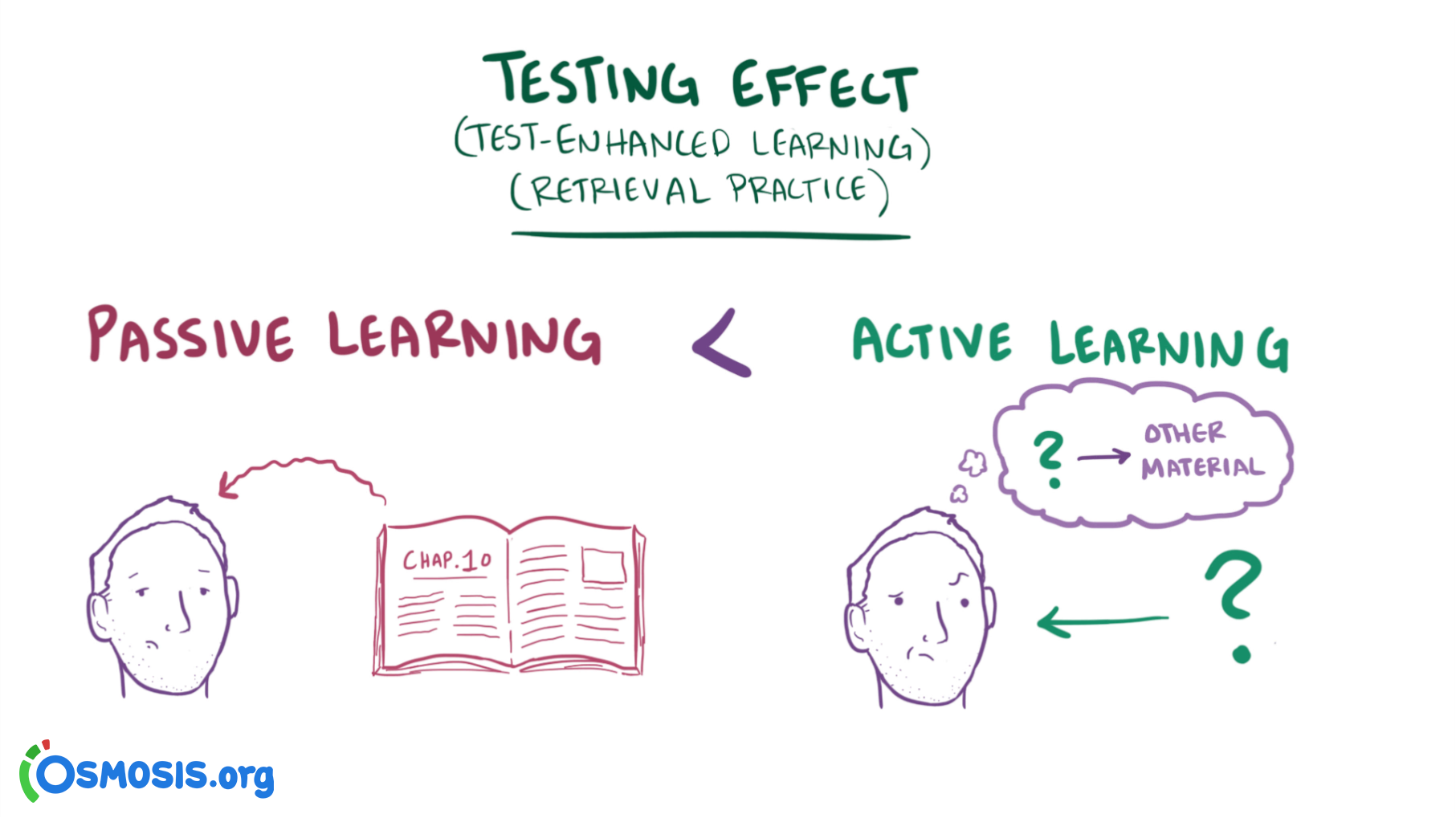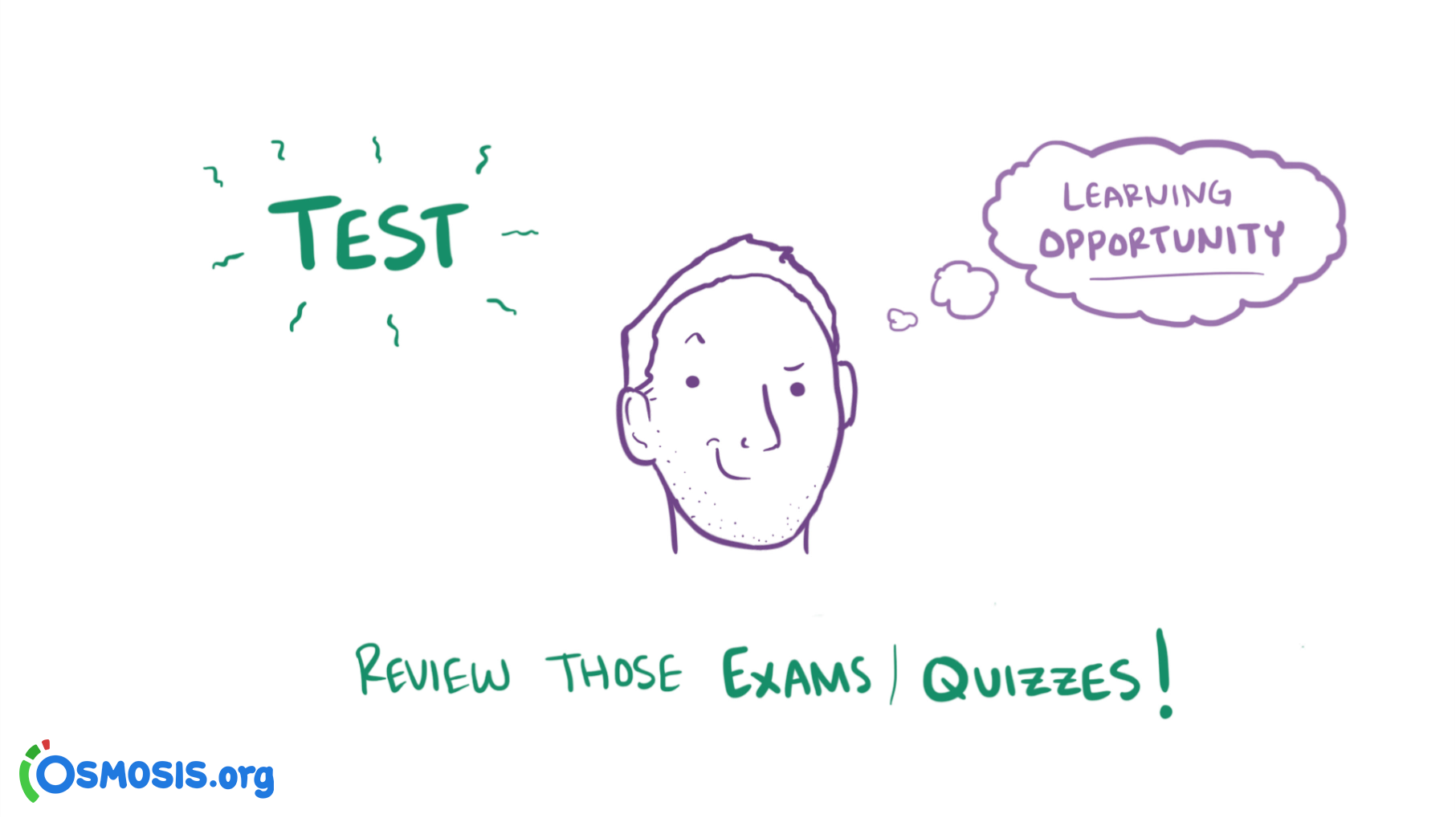Last Updated on June 26, 2022 by Laura Turner
Welcome to part two of our blog series in which we share proven learning strategies behind the Osmosis platform that help students learn medicine more effectively. (Read about spaced repetition and memory palaces in parts 1 and 3 of the series!)
Today, we’re going to explore test-enhanced learning, the act of testing yourself to improve your knowledge of a given subject. This study technique is discussed throughout our new textbook, How to Learn in the Health Professions, as well as in our video series on the science of learning.
What is test-enhanced learning?
https://youtube.com/watch?v=_wqG7g1kZUo
Love it or hate it, exams are here to stay. There are over 100 years of research backing up the benefits of test-taking, which dramatically improves the brain’s ability to retain and recall difficult concepts. This is the power of the testing effect.
Test-enhanced learning is what you do when you’re trying to leverage the testing effect to deepen your understanding of a topic. By incorporating self-testing into your daily study routine, you’ll develop a deeper understanding of what you’re trying to learn, while also cultivating a better mindset for taking exams.
The struggle is real… and it’s making you smarter
Test-enhanced learning works simply because it’s a form of active learning. We often think of our brains as intelligent sponges that passively absorb everything we read, but to achieve mastery of higher-level concepts, just reading isn’t enough: you have to actively engage with what you’re learning and demonstrate the ability to situate all that knowledge within a broader context.
Being an active learner and training yourself to make these connections is extremely important for learning medicine. It’ll increase the likelihood you’re able to recall everything when you need it, whether you’re taking an exam, or treating someone in the emergency room.

It’s important to actually challenge yourself with test-enhanced learning. Research has shown there are serious intellectual benefits to struggling with material you’re trying to understand. Remember that the next time you’re agonizing over the coagulation cascade or renal tubular acidosis and wondering if a career in medicine is for you—these difficult moments are just making you a stronger learner!
When you’re studying medicine, you should always be going back and reinforcing old information using practice tests; the human body is the most complex system we know, and when you begin your career in medicine, you’ll often need to recall seemingly random or disconnected facts in urgent situations. The more time you spend doing this via self-testing, the more easily things will come to you in those critical moments.
As an example, one study published in the Medical Education Journal compared medical residents who studied with practice tests versus those who simply re-read information about two diseases. Those who underwent practice testing achieved on average 13 percent higher scores than their counterparts who re-read the information, and this was six months after they first learned the material, showing greater long-term retention.
Again, it’s all about timing!
Just like with spaced repetition, timing your self-testing sessions strategically is crucial for taking full advantage of the testing effect’s benefits. In a study published in Psychological Science, participants read an article and were then tested on the material either one day, one week, or three weeks later. Those who were tested on the material just one day after they learned it had better recall of that information later compared to the one- and three-week groups.
Tips for taking advantage of the testing effect
Okay, so what are the best ways to practice test-enhanced learning on your own? Well, if your teacher gives you a practice test, definitely take it—it’ll help you identify how they word their questions, reducing the chance of any surprises.
Writing your own test questions and flashcards is also an effective strategy; platforms like Osmosis allow you to combine your self-testing with a spaced repetition algorithm for optimally-timed studying, and will also send you relevant practice questions as you approach your exam date.

Finally, if you’re someone who dreads exams, a change of mindset might be beneficial. Remember, exams aren’t just about assessing your performance as a student—they’re an important learning opportunity! When you get a test or exam back, make sure to check where you made mistakes to reinforce your knowledge of these areas.
To learn more about test-enhanced learning and other optimal study strategies for medical and health education, visit osmosis.org.
